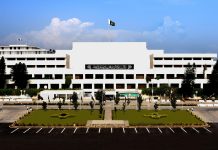By Adnan Rafique
ISLAMABAD: Enforcement efforts under a plan have been stepped up to clamp down on use of single-use plastics in the Islamabad and its adjoining areas and punish those violating the ban on single-use plastic items, particularly polythene bags, Ministry of Climate Change and Environmental Coordination’s media spokesperson Mohammad Saleem Shaikh said in a statement on Sunday.
Renewed efforts ramped up to crack down on single-use plastics in Islamabad
Sharing details of the various enforcement crackdowns conducted in various areas of the federal capital city under the plan, he said that the Pakistan Environmental Protection Agency (Pak-EPA) in collaboration with the Islamabad Capital Territory (ICT) administration has intensified its enforcement of the Single-Use Plastics (Prohibition) Regulations, 2023 through a series of inspection drives, targeting prominent commercial areas in the city.
Inspection teams visited bakeries, hotels, plastic suppliers, and local vendors across various localities to ensure strict compliance with the ban on single-use plastics. Renewed efforts ramped up to crack down on single-use plastics in Islamabad. These operations resulted in the confiscation of significant quantities of prohibited items and fines imposed on multiple violators, the climate change and environmental coordination ministry’s spokesperson Saleem Shaikh added. The ministry official recalled that on May 23, a Pak-EPA’s enforcement team conducted a targeted inspection in Islamabad’s upscale G-6 sector, seized over 15 kilogrammes of banned single-use plastic products.
Six shopkeepers were fined and issued warnings for non-compliance. Encouragingly, most shops in the area were found using eco-friendly alternatives for packaging.
In a separate operation on May 22, Pak-EPA teams carried out inspections at key markets, including G-9 Peshawar Morr Market, Safa Gold Mall (F-7 Markaz), and Rana Market (F-7/2).
Renewed efforts ramped up to crack down on single-use plastics in Islamabad
These raids led to the confiscation of over 300 kilogrammes of banned items and the imposition of Rs. 45,000 in fines on seven violators, the ministry spokesperson Muhammad Saleem said further. The official added that earlier on May 16, inspections in G-7 Markaz and adjacent markets resulted in the seizure of 150 kilogrammes of single-use plastics and Rs. 10,000 in fines.
Lauding the joint crackdowns by Pak-EPA and ICT Administration against those violating the single-use plastics. Pak-EPA Director General Nazia Zeb Ali emphasised the agency’s firm in its stance against plastic pollution. “
This crackdown is part of our sustained efforts to enforce the Single-Use Plastics (Prohibition) Regulations, 2023, so as to reduce plastic pollution in the capital city and its adjoining areas for overall protection of environment and public health,” she remarked.
She highlighted that stringent actions would continue at all levels against those disregarding the ban, contaminating the city’s environment and harming public health.
The Single-Use Plastics (Prohibition) Regulations, 2023 ban the manufacture, import, distribution, sale, and use of single-use plastics, including polythene bags and disposable beverage containers, within the Islamabad Capital Territory (ICT).
Pak-EPA remains committed to ongoing inspection efforts and strict enforcement to ensure environmental protection and promote sustainable practices.
Pak-EPA’s DG Nazia Zeb Ali warned that anyone found using, selling and manufacturing polythene bags would be liable to pay fines.
In case of violation of law, an individual would be fined Rs5,000, a manufacturer Rs100,000 and a shopkeeper Rs10,000.
Highlighting the environment and public health burden of single-use plastic items, Nazia Zeb Ali remarked that single-use plastics, such as polythene bags, disposable utensils, and plastic straws, are among the leading contributors to urban pollution.
“In Islamabad alone, a significant portion of municipal waste is composed of polythene bags. Besides being known as a major cause of deleterious impact on environment and public health, these plastics clog drainage systems, contribute to urban flooding and take centuries to decompose,” she highlighted.
She said further that such plastics release toxic chemicals as they degrade. These microplastics enter soil, water, and even the air, posing long-term health risks.
Open burning of plastic waste, still a common practice, produces harmful fumes that directly impact respiratory health—especially among children and the elderly, she added.
Nazia Zeb Ali also urged the public to support the government’s efforts to rid the city of the growing burden of single use plastics and its adverse impacts on environment, public health and the city’s sewer networks.
“As Pakistan’s scenic capital city and a fast emerging hub for tourism, we all must play our part and strive to preserve its natural green belts, parks and Margalla Hills by getting rid the city of the single-use plastic litter and ensure that it no more spoils scenic areas and threaten wildlife that may ingest or become entangled in plastic waste,” Pak-EPA’s DG Nazia Zeb Ali said.






